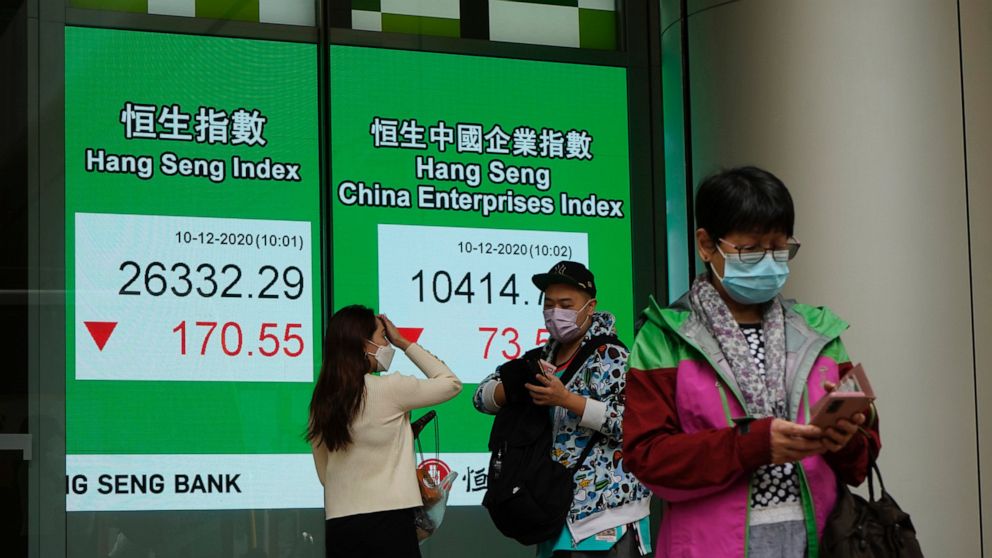US stocks wobble as pandemic damage to economy piles up
U.S. stocks are wobbling Thursday, following more evidence that the pandemic is tightening its grip on the economy and as investors wait to see if Congress will do anything about it
NEW YORK — U.S. stock indexes are mostly lower in afternoon trading Thursday, following more evidence that the pandemic is tightening its grip on the economy and as investors wait to see if Congress will do anything about it.
The S&P 500 was down 0.1% after flipping between gains and losses a day after pulling 0.8% lower from its record high. The Dow Jones Industrial Average was down 77 points, or 0.3%, at 29,991, as of 1:53 p.m. Eastern time, and the Nasdaq composite was 0.4% higher.
Treasury yields wobbled but were holding relatively steady after a report showed 853,000 U.S. workers applied for unemployment benefits last week. That was more than economists expected and an acceleration from the prior week. It’s also the latest reminder that the pandemic is doing more damage to the economy in the near term, even if prospects are rising that a COVID-19 vaccine will get the economy healthy in the longer term.
Economists and investors have been imploring Congress to deliver more financial support in the meantime, to help carry the economy until it can stand on its own. After months of partisan bickering and no progress on Capitol Hill, momentum seemed to swing higher recently for a deal, but talks are still mired in deep uncertainty.
On Thursday, Treasury Secretary Steven Mnuchin reported headway in talks over President Donald Trump’s latest $900 billion-plus plan. But, Democrats and Republicans are still at odds over the size and scope of any deal.
“There’s nothing really new there, except now you’ve got some softening economic data,” said Paul Christopher, head of global market strategy at Wells Fargo Investment Institute
Thursday’s discouraging report on joblessness could add to the urgency Congress feels to act. In the face of uncertainty, though, trading was jumbled.
Energy stocks, which often move with expectations for the economy’s strength, were climbing to the biggest gain among the 11 sectors that make up the S&P 500, at 2.6%. They rose with crude oil prices.
Starbucks gained 5.3% for one of the bigger gains in the index after the coffee chain backed its profit forecast for this fiscal year and said it expects “outsized growth” in the following one.
But industrial companies, whose stocks have been been tracking hopes for the economy, were falling. So were the majority of stocks in the S&P 500.
The choppiness in the market is not unheard of, considering the stellar gains for stocks in November and uncertainty still lingering over the timing of vaccine distribution as virus cases rise, Christopher said.
“It’s not unusual to see some consolidation after a strong month like that,” he said.
Elsewhere in the market, shares of Airbnb soared about 140% shortly after they began trading a little after 1:30 p.m. Eastern time. Interest has been high for the home sharing company, which has seen its business recover faster through the pandemic than hotels have.
A day earlier, another San Francisco-based company, DoorDash, soared nearly 86% in the first day of trading for its stock.
In Europe, stock markets were subdued even though the European Central Bank delivered another half-trillion of euros ($600 billion) in stimulus for the economy. Coronavirus counts are also spiraling higher on the continent, and its central bank is promising to buy more bonds to push the economy along. Germany’s DAX lost 0.3%, and France’s CAC 40 edged up by 0.1%. The FTSE 100 in London rose 0.5%.
In Asia, markets made modest moves. Japan’s Nikkei 225 slipped 0.2%, South Korea’s Kospi fell 0.3% and Hong Kong’s Hang Seng dipped 0.3%. Stocks in Shanghai were virtually unchanged.
The yield on the 10-year Treasury slipped to 0.92% from 0.93% late Wednesday. A government report released Thursday morning showed that inflation was slightly stronger last month than economists expected, though it remains modest.
———
AP Business Writer Elaine Kurtenbach contributed.
![]()


